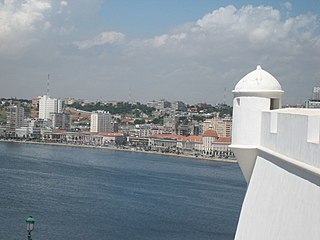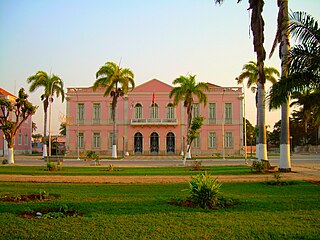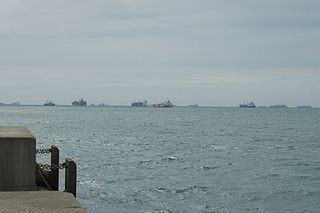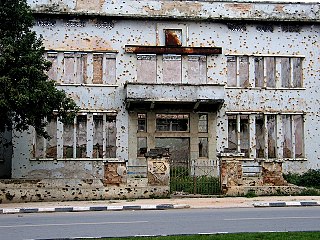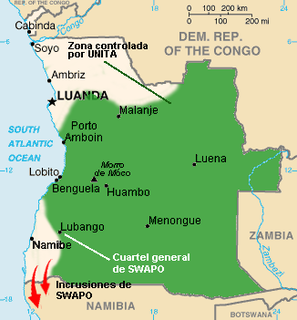| UN Security Council Resolution 1149 | |
|---|---|
Angolan capital Luanda | |
| Date | 27 January 1998 |
| Meeting no. | 3,850 |
| Code | S/RES/1149 (Document) |
| Subject | The situation in Angola |
Voting summary | 15 voted for None voted against None abstained |
| Result | Adopted |
| Security Council composition | |
Permanent members | |
Non-permanent members | |
United Nations Security Council resolution 1149, adopted unanimously on 27 January 1998, after reaffirming Resolution 696 (1991) and all subsequent resolutions on Angola, the Council extended the mandate of the United Nations Observer Mission in Angola (MONUA) until 30 April 1998. [1]

United Nations Security Council resolution 696, adopted unanimously on 30 May 1991, after noting the recent desire to sign the Bicesse Accords between the MPLA and UNITA in Angola, the recent withdrawal of all Cuban troops and considering a report by the Secretary-General, the Council approved Javier Pérez de Cuéllar's recommendations and established the United Nations Angola Verification Mission II, noting that the mandate of the United Nations Angola Verification Mission I (1989–1991) was coming to an end.

Angola, officially the Republic of Angola, is a west-coast country of south-central Africa. It is the seventh-largest country in Africa, bordered by Namibia to the south, the Democratic Republic of the Congo to the north, Zambia to the east, and the Atlantic Ocean to the west. Angola has an exclave province, the province of Cabinda that borders the Republic of the Congo and the Democratic Republic of the Congo. The capital and largest city of Angola is Luanda.
Contents
The Security Council welcomed an agreement between the Government of Angola and UNITA for implementing the remaining tasks of the Lusaka Protocol. MONUA was recognised as playing a critical role at this stage in the peace process. The Secretary-General was instructed to submit a report no later than 13 March 1998 regarding the implementation of the timetable, the possible reorganisation of MONUA and recommendations on a United Nations presence after 30 April 1998.

The National Union for the Total Independence of Angola (UNITA) is the second-largest political party in Angola. Founded in 1966, UNITA fought alongside the Popular Movement for the Liberation of Angola (MPLA) in the Angolan War for Independence (1961–1975) and then against the MPLA in the ensuing civil war (1975–2002). The war was one of the most prominent Cold War proxy wars, with UNITA receiving military aid from the United States and South Africa while the MPLA received support from the Soviet Union and its allies.
The Lusaka Protocol, initialed in Lusaka, Zambia on October 31, 1994, attempted to end the Angolan Civil War by integrating and disarming UNITA and starting national reconciliation. Both sides signed a truce as part of the protocol on November 15.1994 and the treaty was signed on November 20, 1994

The Secretary-General of the United Nations is the head of the United Nations Secretariat, one of the six principal organs of the United Nations. The Secretary-General serves as the chief administrative officer of the United Nations. The role of the United Nations Secretariat, and of the Secretary-General in particular, is laid out by Chapter XV of the United Nations Charter.
After calling for all agreements to be implemented in a timely manner, the resolution stressed the need for Angolan law to be strengthened and to create a secure environment for United Nations and humanitarian personnel. [2] UNITA in particular was called upon to refrain from actions that would lead to increased tensions or hinder the normalisation of state administration throughout the country, and to co-operate with MONUA. The Council reaffirmed its readiness to impose further measures, in accordance with Resolution 1127 (1997), if UNITA did not comply and allow access for verification activities.

United Nations Security Council resolution 1127, adopted unanimously on 28 August 1997, after reaffirming Resolution 696 (1991) and all subsequent resolutions on Angola, the Council, acting under Chapter VII of the United Nations Charter, imposed sanctions on UNITA following the lack of compliance in implementing peace agreements after the civil war.
Finally, the resolution concluded by stating that a summit meeting between the President of Angola José Eduardo dos Santos and the leader of UNITA Jonas Savimbi could reduce the tension and help the Angolan peace process.

The President of the Republic of Angola is both head of state and head of government in Angola. According to the constitution adopted in 2010, the post of Prime Minister is abolished; executive authority belongs to the President who has also a degree of legislative powers, as he can govern by decree.

José Eduardo dos Santos is an Angolan politician who served as President of Angola from 1979 to 2017. As President, José Eduardo dos Santos was also the commander in chief of the Angolan Armed Forces (FAA) and President of the People's Movement for the Liberation of Angola (MPLA), the party that has ruled Angola since it gained independence in 1975. He was the second-longest-serving president in Africa, surpassed only by President Teodoro Obiang Nguema Mbasogo of Equatorial Guinea, who took power less than two months before dos Santos.

Jonas Malheiro Savimbi was an anti-communist and anti-colonialist Angolan political and military leader who founded and led the National Union for the Total Independence of Angola (UNITA).



